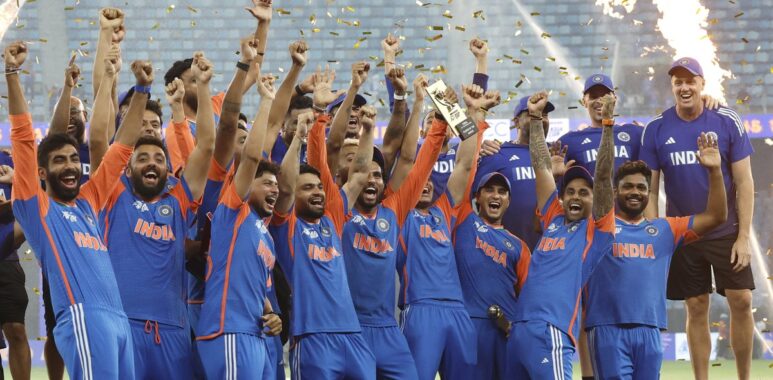
Epic Showdown in the Desert: India Edges Pakistan in Thriller to Claim Ninth Asia Cup Title
In the sweltering heat of Dubai International Cricket Stadium, under the glare of floodlights and the weight of a billion expectations, the eternal rivals of world cricket—India and Pakistan—clashed in the final of the Men’s T20 Asia Cup 2025 on September 28. What unfolded was not just a cricket match but a high-stakes drama laced with skill, tension, and geopolitical undercurrents. India, chasing a record-extending ninth title, scraped through by five wickets with just two balls to spare, sealing a victory that will be etched in the annals of the sport’s most storied rivalry. Tilak Varma’s unbeaten 69 emerged as the defining knock in a chase that teetered on the brink of collapse, while off-spinner Kuldeep Yadav’s 4 for 30 dismantled Pakistan’s batting lineup. But beyond the boundary, the evening descended into controversy, with India refusing the trophy in a standoff that highlighted the deepening fissures between the two nations.
The Asia Cup, Asia’s premier limited-overs tournament, has long been a battleground for India and Pakistan, where national pride overrides every other emotion. This edition, hosted entirely in the UAE due to ongoing security concerns in host nations, promised fireworks from the outset. With eight teams vying for glory—India, Pakistan, Sri Lanka, Bangladesh, Afghanistan, UAE, Hong Kong, and a surprise qualifier from the ACC Emerging Cup—the tournament kicked off on August 30 in Sharjah. India entered as defending champions, having won the 2023 edition in a rain-marred affair, while Pakistan, smarting from a group-stage exit in 2023, were hungry for redemption.
 The Road to the Final: A Tournament of Twists
The Road to the Final: A Tournament of Twists
The group stage set the tone for high-octane T20 cricket. India, led by the dynamic Suryakumar Yadav, topped Group A with four wins in five games, their only blemish a narrow two-wicket loss to Bangladesh in a rain-affected match. Abhishek Sharma, the young opener from Punjab, stole the show, amassing 314 runs across seven innings at a blistering strike rate of 200, including 19 sixes that echoed through the desert stadia. His partnerships with Shubman Gill provided explosive starts, while the middle order, featuring Tilak Varma and Shivam Dube, added depth and firepower.
Pakistan, in Group B, stuttered initially with a shock defeat to minnows UAE but roared back with convincing wins over Hong Kong and Afghanistan. Captain Salman Ali Agha, a tactical all-rounder, instilled resilience, but it was the emergence of Saim Ayub that caught eyes. The 22-year-old opener from Karachi scored consistently, setting the stage for the knockouts. Sri Lanka, the 2022 champions, advanced as runners-up in Group A, while Afghanistan pipped Bangladesh for the second spot in Group B on net run rate.
The Super Four stage, played in Abu Dhabi and Dubai, intensified the drama. India steamrolled Sri Lanka by eight wickets in their opener, with Abhishek’s century (102 off 55) lighting up the scoreboard. Pakistan, however, faced heartbreak in their must-win clash against India—a seven-wicket semi-final-like thrashing where Jasprit Bumrah’s 3 for 18 restricted them to 120, chased down in 14 overs. Afghanistan stunned everyone by beating Sri Lanka, but India and Pakistan sealed their final spots with dominant performances. In the semi-finals, India outclassed Afghanistan by 42 runs, with Kuldeep’s guile (3/22) and Dube’s all-round show (45 and 2/28) shining. Pakistan edged Sri Lanka in a low-scorer, thanks to Shaheen Shah Afridi’s 4/19 and a gritty 52 from Fakhar Zaman.
By the eve of the final, the narrative was clear: this was redemption for India after their 2024 T20 World Cup semi-final loss to South Africa, and for Pakistan, a chance to end a seven-year drought in ICC/ACC silverware. Ticket sales crashed servers, and viewership projections soared past 500 million, with fans from both sides converging on Dubai, turning the city into a sea of blue and green.
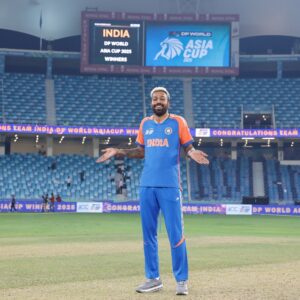 The Toss and Pakistan’s Innings: A Tale of Promise and Peril
The Toss and Pakistan’s Innings: A Tale of Promise and Peril
At 6:30 PM local time, under a clear sky with temperatures hovering at 35°C, Suryakumar Yadav called correctly at the toss and elected to field first—a decision vindicated by the dew factor that often aids chases in Dubai. Pakistan opener Saim Ayub and Fakhar Zaman strode out to a deafening roar, the stadium’s 25,000 seats packed with expatriate fans waving flags and chanting slogans that drowned out the national anthems.
The powerplay belonged to Pakistan. Ayub, with his elegant cover drives, and Zaman, unleashing ferocious pulls, raced to 45 without loss in six overs. Ayub’s fifty came off 32 balls, a mix of crisp timing and calculated aggression, while Zaman’s 46 off 28 included three sixes that cleared the long boundaries. The duo added 113 for the first wicket, putting India under pressure. But as so often in high-stakes games, the middle order crumbled.
Enter Kuldeep Yadav. The left-arm wrist-spinner, returning from a minor niggle, struck gold in the 17th over—a triple-wicket maiden that tilted the game. He dismissed Iftikhar Ahmed (lbw, playing back to a googly), Salman Agha (caught at deep midwicket, miscuing a slog), and Imad Wasim (bowled, beaten by turn). Pakistan slumped from 113/1 to 122/5 in a blink, losing nine wickets for just 33 runs. Axar Patel chipped in with 2/25, including the vital scalp of Ayub (caught at long-on off a skier), while Varun Chakaravarthy and Bumrah mopped up the tail. Haris Rauf’s late cameo (18 off 10) pushed the total to 146 all out in 19.1 overs, but it felt under par on a batsman-friendly pitch.
Pakistan’s bowlers, led by Faheem Ashraf and Haris Rauf, had fire, but the batting fragility exposed their over-reliance on the top order. Salman Agha later lamented, “We had them on the ropes early in the chase, but couldn’t close it out. Credit to Tilak—he played like a champion.”
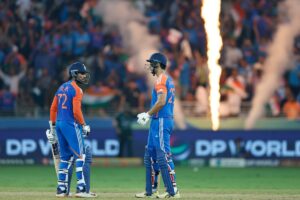 India’s Chase: From the Brink to Glory
India’s Chase: From the Brink to Glory
India’s reply began disastrously. Shaheen Afridi, with his lethal swing, accounted for Yashasvi Jaiswal (5, edged to slip) and Abhishek Sharma (8, trapped lbw) in his first over. Faheem Ashraf joined the party, castling Shubman Gill (4) with a searing yorker. At 20/3 after 4.2 overs, the scoreboard pressure mounted, and whispers of another choke echoed through the stands.
Enter Sanju Samson and Tilak Varma. The Rajasthan Royals duo steadied the ship with a 40-run stand, Samson grinding out 20 off 18 before falling to Abrar Ahmed’s leg-spin. Now, with 88 needed off 72 balls, the onus fell on Tilak. The 23-year-old from Hyderabad, known for his IPL exploits, channeled his inner finisher. Partnering with Shivam Dube, he rebuilt meticulously—rotating singles, picking gaps, and unleashing boundaries when needed.
The 60-run partnership off 48 balls between Tilak and Dube (33 off 22, with two sixes) was a masterclass in temperament. Dube’s muscular hitting—a six over cow corner off Rauf—eased the required rate below seven, but his dismissal (caught at deep square leg) left India at 110/5, needing 37 off 30. Rinku Singh joined Tilak, and the duo milked the spinners in the middle overs.
The death overs became a nail-biter. With 30 needed off 18, Haris Rauf returned, conceding just four in his third over. 17 off 12: Tilak flicked a boundary off Imad Wasim. 10 off 6: Pressure on, with the crowd on its feet. Rauf bowled a dot, then a wide. Tilak, facing the fifth ball, eyed the leg-side and launched a six over deep midwicket—8 off 5 became 2 off 2. The final ball: a single to Rinku, and Tilak scampered back for the winning run. 150/5 in 19.4 overs. Pandemonium ensued—hugs, fist pumps, and a team huddle that lasted minutes.
Tilak’s 69* off 53 (3×4, 4×6) wasn’t flashy but flawless—strike rate of 130, with 40 dot balls faced to absorb pressure. “I’ve waited for moments like this,” Tilak said post-match. “The dressing room believed; Surya bhai’s calm rubbed off on us.” Abhishek Sharma, despite his final duck, was crowned Player of the Tournament for his explosive campaign.
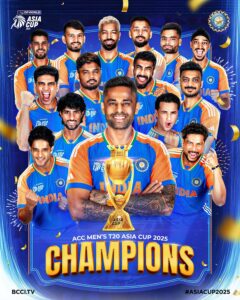 The Post-Match Storm: Trophies, Handshakes, and Heartbreak
The Post-Match Storm: Trophies, Handshakes, and Heartbreak
As the players walked off, the real drama unfolded. The presentation ceremony, scheduled for 10 PM, was delayed by 90 minutes amid chaos. ACC chairman Mohsin Naqvi, a former Pakistan PCB head, was set to hand over the trophy. But India, citing “geopolitical sensitivities” and Naqvi’s alleged pro-Pakistan bias, refused to accept it from him. BCCI secretary Devajit Saikia stated, “We decided not to accept the Asia Cup 2025 trophy from the ACC chairman, who represents a country currently at odds with ours. It is extremely unfortunate and unsportsmanlike.”
Naqvi stormed off with the trophy, only for it to be redirected to Khalid Al Zarooni, vice-chairman of the Emirates Cricket Board. No handshakes were exchanged—India’s players avoided eye contact with their Pakistani counterparts, a snub that Salman Agha decried: “What India has done in this tournament is very disappointing. They’re not disrespecting us by not shaking hands—they’re disrespecting cricket.” In a fit of frustration, Agha tossed the runners-up cheque into the stands, drawing boos from the pro-India crowd chanting “Bharat Mata Ki Jai.”
Social media erupted. Delhi Capitals posted a video editing a trophy into India’s huddle with the caption “Fixed it.” Bumrah mimicked Rauf’s earlier celebration after dismissing him, sparking memes. Suryakumar Yadav, ever the diplomat, quipped, “Since I started playing cricket, I’ve never seen a champion team being denied the trophy. The real trophies are in the dressing room with the 14 players and support staff.” Abhishek added levity: “Obviously everyone has a plan to win a trophy. And we actually got one—Surya bhai brought it! We felt it, we knew its weight.”
The BCCI plans a formal protest at the ICC Board meeting in November, while former Pakistan captain Shoaib Malik fumed, “Just see how much pressure the players went through to win the Asia Cup. Why did they do all that hard work? To win the Asia Cup trophy… And after they’ve worked so hard, you don’t even come to take the trophy.”
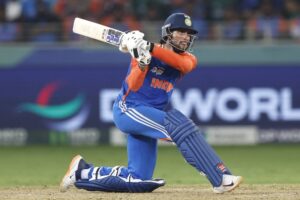 Analysis: Rivalry’s Double-Edged Sword
Analysis: Rivalry’s Double-Edged Sword
This final encapsulated the India-Pakistan rivalry’s allure and peril. On the field, it was pure cricket—Pakistan’s aggressive starts neutralized by India’s spin wizardry, and a chase that tested resolve. Kuldeep’s resurgence (tournament haul: 12 wickets) underscored India’s depth in subcontinental conditions, while Tilak’s poise signals a bright future post-Rohit-Kohli era.
Off the field, the toxicity threatens the game’s spirit. As Al Jazeera opined, “Handshake snubs, trophy refusal and jingoism in Dubai show how their toxic rivalry threatens the game itself.” The lack of bilateral series since 2012, coupled with border tensions, has militarized matches. Yet, moments like Bumrah-Rauf banter remind us of shared roots—both fast bowlers who idolize Wasim Akram.
For India, this win boosts morale ahead of the 2026 T20 World Cup co-hosting with Sri Lanka. Suryakumar’s captaincy, blending aggression with empathy, shone: “I don’t think I am out of form; I am out of runs. I believe in my preparations.” Pakistan, meanwhile, must address middle-order woes; Agha’s leadership is under scrutiny.
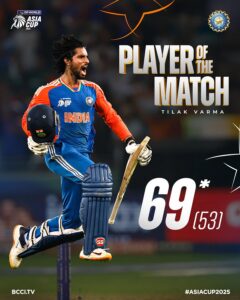 Legacy in the Sands of Time
Legacy in the Sands of Time
As the Dubai night faded, India’s ninth Asia Cup title—leveling Sri Lanka’s record—hung in the air, trophy or not. Abhishek’s six-hitting spree, Kuldeep’s artistry, and Tilak’s grit will inspire generations. But the real victor? Cricket’s enduring pull, even amid shadows.
In a rivalry born in 1947’s partition, matches like this transcend sport—they heal, divide, unite. Here’s to more battles, sans the bitterness. For now, India celebrates, Pakistan reflects, and the world watches, breathless.

